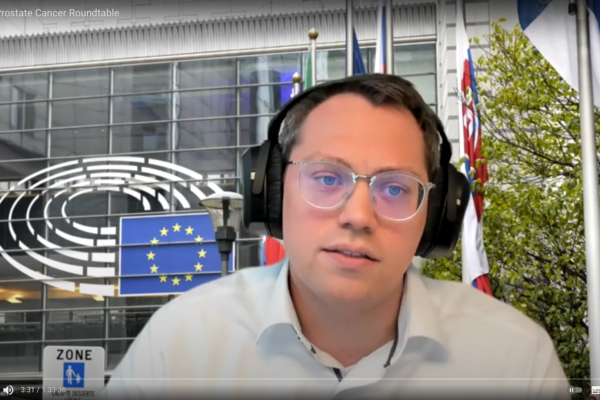Prostate cancer community points the way forward for EU politicians
Key figures in prostate cancer called for political action to encourage early detection programmes and awareness across Europe at an online round-table event, held as part of the Let’s Talk Prostate Cancer initiative.
The meeting discussed a wide range of topics related to improving prostate cancer outcomes in Europe, and involved policy makers, clinicians, voluntary organisations and patient representatives. It is now available to view on the Europa Uomo YouTube channel.
Among the speakers were Tiemo Wölken (pictured), Member of the European Parliament, and André Deschamps, Chairman of Europa Uomo, who said that early detection programmes were essential – both to reduce mortality and to improve quality of life.
“We must realise that more than 50% of prostate cancer patients in Europe are diagnosed in a metastatic phase, too late for long lasting treatment,” said André Deschamps. “This is due to the lack of early detection programmes.”
“We have the scientific knowledge today to prevent prostate cancer deaths and give patients a much better quality of life. It is the duty of policy makers to make that happen and change health care systems.”
The Let’s Talk Prostate Cancer expert group is calling on European policy makers to make prostate cancer a priority, and to work within the European institutions to give member states the tools, guidance and incentives to ensure that they have the best possible prostate cancer plans for their country. Last month, it launched an online digital atlas providing information on prostate cancer care across Europe.
With the forthcoming European Cancer Plan in mind, André Deschamps said awareness and early detection should be promoted at national and EU level. “We patients call for education and campaigns at all levels supported by policy makers to educate individuals about their risk, prevention methods and treatment.”
His comments were echoed by Hendrik van Poppel, Adjunct Secretary General of the European Association of Urology (EAU). He called on European politicians to endorse EAU’s multidisciplinary guidelines for prostate cancer care, and to prioritise decreasing the incidence of advanced prostate cancer.
“There’s only one way for this to be done,” he said. “Not with population-based PSA screening, but with stratified early detection programmes with an informed patient. This must be included in the Cancer Plan and we have to rely on the support of EU politicians for this.”
